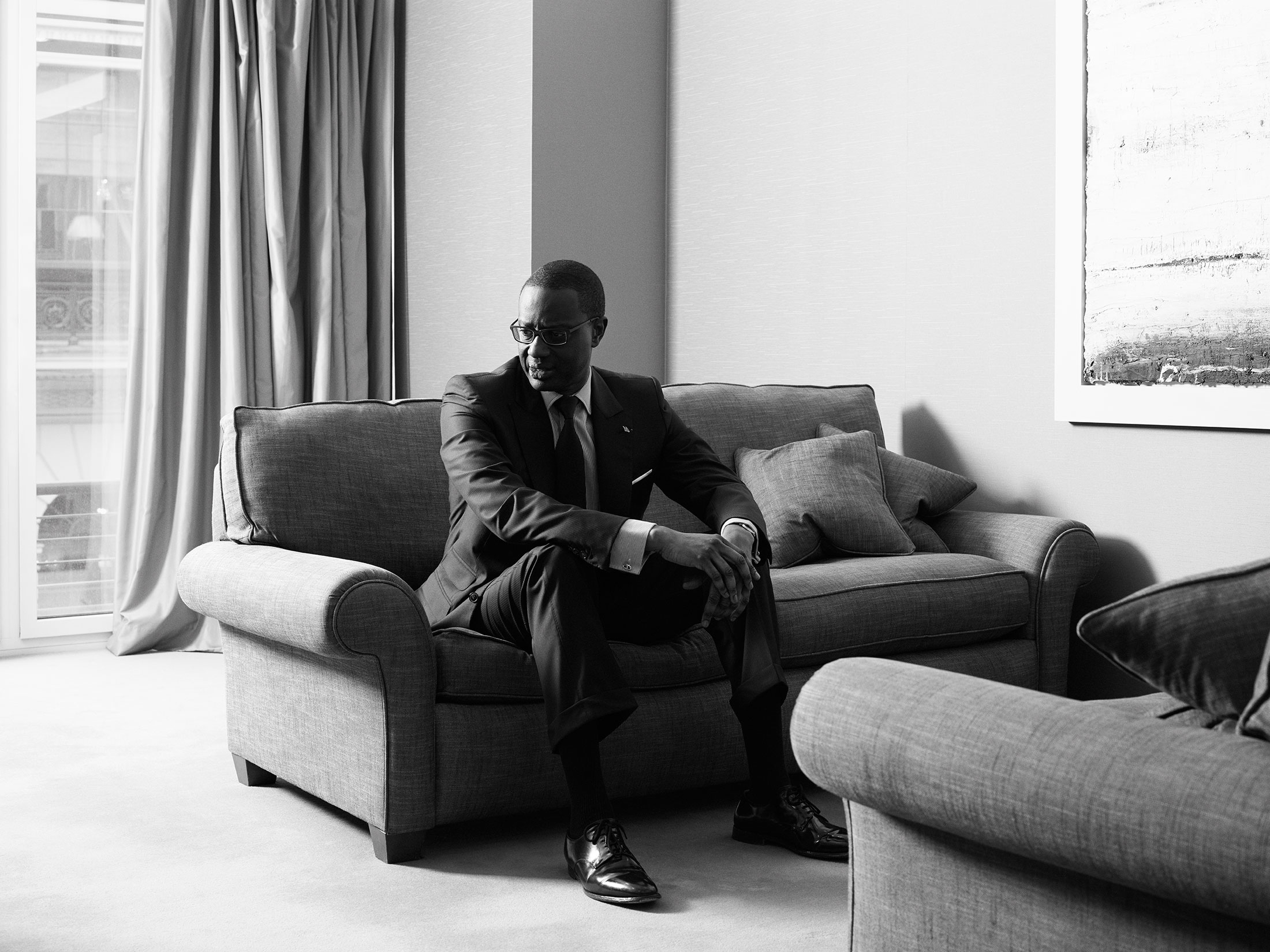
FL Who else have you learned from?
TT I learn from everybody, really. I always recruit people to work for me who are much better than I am at many things. And I watch them and try to learn from them, because I really think everybody is good at something—at least one thing, if not more. And if you look every once in a while, you think, “Wow, that person is really interesting.”
FL Whom do you admire?
TT I’m not going to tell you. Then everyone else will be annoyed. No, there are many people I admire.
FL You heard from Roger Federer when you became CEO of Credit Suisse.
TT I was very touched. He sent a video message saying, “Welcome to Switzerland. We hope you have a good time here.” I have immense admiration for athletes. In some ways they exemplify the best features of the human spirit. The level of excellence they achieve, the apparent ease, the grace. Roger is a model of a human being. He always behaves with dignity, he’s a great champion, he’s always gracious to his opponents whether he wins or loses, and he’s a Credit Suisse client. [Laughs.]
FL Who else?
TT Well, I have a fascinating life. On my last trip to China, I counted 20 billionaires—in dollars—individually in an hour. Well, three hours, because it was a dinner. And each of them is exceptional. I went to China for the first time in 1984, so often I ask, “What were you doing in 1984?” And the answer, generally, is “All I owned was a bicycle.” And then you go through how they got to where they are. They’re exceptional people. I love spending time with them, and I learn a lot.
FL How does your business in Asia differ from elsewhere?
TT On the state of wealth in Asia, 65 percent is in the hands of the first generation—so the people who actually made the money. In Europe, most of the money—more than half—is in the hands of the fourth or fifth generation. The kind of wealth management you do in those two universes is very different.
FL Do you see consolidation among European banks?
TT I think that would be very difficult in this new environment. One of the biggest headlines in the media remains “too big to fail.” If that’s the motto, how do you make institutions bigger? By definition, if you put two institutions together, you create a bigger institution.
FL If you were to buy one bank?
TT As I’ve said, the whole mood is not supportive of that. We have plenty of organic growth available. Plenty. We don’t need to do a transaction.
FL Credit Suisse itself is the product of consolidation. Does the First Boston legacy hinder or help?
TT Look, you can’t separate things. We’re the product of several traditions, and each is a core part of our identity. This is like asking someone if their parents hinder or help. You’ve got what you’ve got: You have a mother, you have a father. That’s our genetic heritage. And there are many great things about First Boston. It’s precious to have in our DNA, because it was always able to punch above its weight. I like the kind of grit and go-getter attitude there.

FL Which do you prefer, winning or competing?
TT Oh, that’s a philosophical question. I think both are very enjoyable. I enjoy competition. But fair competition, with rules, transparent competition where everybody has a chance. Winning is nice, if it’s done the right way without breaking the rules, and if you can win, in many championships, there’s a fair play title. If you can both get the fair play prize and win, then that’s great.
FL And in business?
TT It depends on how you define winning. To me, winning is serving your clients, having their loyalty, because ultimately that’s what business is, that’s what keeps you going. And then lasting. Prudential, where I was CEO previously, was created in 1848. Credit Suisse was created in 1856. So I’ve had the privilege of serving relatively old companies, and that’s always present in my mind. I have to pass the baton. I have to keep it going because, God, it’s been going a long time.
FL What’s a better business, insurance or banking?
TT [Laughs.] They are both vital for the world economy and play a very important social role.
FL You more than doubled the share value at Prudential. Do you want to be the CEO who saved Prudential or the one who saves Credit Suisse?
TT I just aspire to leave the company in a better state than I found it. And that can continue.
FL Would you ever go back to politics?
TT No. That’s the easiest question you’ve asked me.
FL Why not?
TT There’s a time for everything. I don’t regret doing it. I learned an enormous amount about how the government operates, the complexities and the challenges. Which gives me a better understanding vis-à-vis public sector employees. They have a difficult job. Having tried to drive an economy, that’s a humbling experience. Driving a company is hard enough.
FL You love your job?
TT [Laughs.] I love the people, because they are worth it. This is why accusations hurt. When people say I am distant. If you come to a town hall with me or the trading floor, it’s the people who are interesting. And there is nothing more exciting than when you can get people to do something they think they’re not able to do. That’s very, very gratifying.
FL If you were to lose your job tomorrow, what would be your biggest regret?
TT That’s a fantastic question. Not being part of the collective journey anymore, that it’s going to go on without me when I think I can make a positive contribution.
FL How hungry are you for this job compared with when you started?
TT Hungrier. I see more opportunities now. I saw some from the outside, but now I can really see the scale and range of the opportunities, and they are vast. Of course, you also understand the problems and the challenges, but luckily you get both.
Credit: Bloomberg








